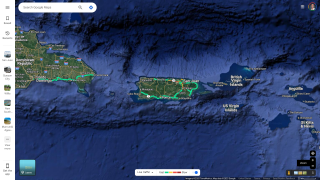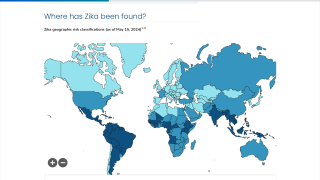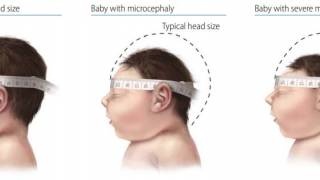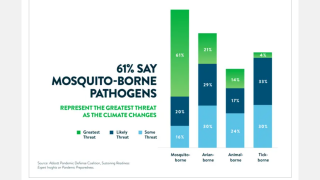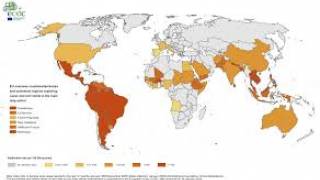Zika Infection Reduced Infant Receptive-Language Skills

A new study by researchers from Harvard University and the University of Puerto Rico suggests a prenatal Zika virus infection is linked to lower receptive language scores during the 1st year of life.
This is an important study since the Zika virus has gained recognition over the past few years as an important new ‘etiology of congenital infection.’
And, there is no known cure for a Zika infection and there is not a preventive vaccine currently available.
This study, published in the JAMA Network Open on October 25, 2019, found even among infants without microcephaly or congenital Zika syndrome, a prenatal maternal Zika infection was associated with lower receptive language scores.
Prior to 2015, few health researchers could have foreseen the potential devastation that the Zika virus was capable of inflicting on an unsuspecting global population. Although initially discovered decades ago in Uganda, and then followed by smaller epidemics (2007 Micronesia; 2013–2014 French Polynesia and other Pacific Islands), Zika had previously received scarce global attention.
However, by May 20, 2017, more than 40,000 confirmed cases of Zika infection had been diagnosed in Puerto Rico. Of these, 3,703 were women infected during pregnancy, and there were at least 38 cases of Zika-associated birth defects in Puerto Rico alone.
The objectives of this study were to determine whether infants of mothers who had at least 1 positive prenatal Zika test result show differences in cognitive scores from ages 3 to 6 months and 9 to 12 months, and whether Zika status was associated with scores on cognitive domains after adjusting for confounders.
This study recruited a sample of the 5,582 Zika-exposed infants in San Juan, Puerto Rico, as of July 7, 2016.
The 65 infants selected for the study, with prenatal Zika exposure, only displayed early behavioral associations with receptive language in the 1st year of life, although larger sample sizes are needed to determine whether this association is clinically significant.
The infants’ cognitive development was assessed using the Mullen Scales of Early Learning, and assessors were blinded to each infant’s Zika status.
The current study sample of 29 infants prenatally exposed to Zika and 36 unexposed controls had mean cognitive standard scores of 105.01, which is about 0.35 above the population mean of 100 on the MSEL.
This slightly higher score may be reflective of the study’s small sample size or high levels of maternal education in our sample.
Additional studies should also examine these associations beyond the 1st year of life to determine whether the association with receptive language is observed and whether there are associations with other domains later in development.
In addition, clinicians should assess cognitive development in Zika-exposed infants and children and provide interventions that can target deficits early.
Related Zika virus news
- 2nd Locally-Acquired Zika Case Confirmed in Southern France
- A Small Molecule May Block Zika Virus Infections
- Zika Virus Returns to Malaysia
- Puerto Rico’s Insufficient Condom Use
The corresponding study author is Charles A. Nelson III, Ph.D., Boston Children’s Hospital, Harvard Medical Schools, Laboratories of Cognitive Neuroscience, 1 Autumn St, Boston, MA 02215 (charles_nelson@harvard.edu). Dr. Nelson disclosed various funding relationships.
This project was supported by a supplement to grant 5UM1AI069415 to Dr. Zorrilla (Integrated UPR-Clinical Trials Unit, principal investigator) and by the National Institute on Minority Health and Health Disparities and the National Institute of Allergy and Infectious Diseases of the National Institutes of Health under award U54MD007587.
This study’s findings are important in the USA, as the State of Florida reported on October 19, 2019, it is monitoring a total of 23 pregnant women with Zika.
Overall, 36 cases of Zika fever have been reported in individuals with travel history to a country or area experiencing Zika virus activity, such as Cuba (6), Haiti (11), and Puerto Rico (3).
Miami-Dade County has reported the most travel-related Zika cases (17) during 2019.
The first US cases of locally transmitted Zika were identified in Florida in July 2016, and in Texas in November 2016.
Zika virus news is published by Zika News.
Our Trust Standards: Medical Advisory Committee
- Cognitive Development of Infants Exposed to the Zika Virus in Puerto Rico
- Zika infections increasing rapidly in Puerto Rico
- CDC: Zika-Associated Birth Defects and Neurodevelopmental Abnormalities Possibly Associated with Congenital Zika Virus Infection
- Zika clinical updates: implications for pediatrics
- https://insights.ovid.com/crossref?an=00149525-201810000-00006





